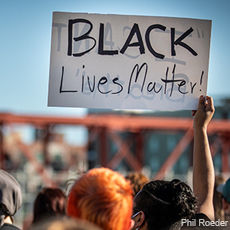
2014-2021 Press Releases
Black Lives Matter to God and Black Lives Matter to United Methodist Women

Protest against Georg Floyd’s murder in Des Moines, May 29, 2020
United Methodist Women continues to grieve the extrajudicial killings of Black people in America. It has only been a few weeks since we spoke out against the killing of Ahmaud Arbery, and in that time two more killings have shaken the country: the death of Breonna Taylor in her own home in Louisville and the death of George Floyd in a public street in Minneapolis. United Methodist Women grieves with the families of those who have been killed.
United Methodist Women condemns the culture of White supremacy and the racism it nurtures. We decry the criminalization of Blackness as it shows up in these most extreme, fatal cases and as it appears in the everyday harassment that disrupts everyday life—from coffee shop meetings to street corner catchups to, most recently, even solo birdwatching. Such racial harassment exhausts the mind, body and spirit of many in the family of God.
At times, United Methodist Women members and leaders have been complicit in this violence: When Ida B. Wells invited legendary lay leader Frances Willard to join in the antilynching movement, Willard said no, in a haunting refusal of solidarity under the false belief that lynching was “necessary” to protect White women. At other times, however, United Methodist Women—of all racial identities—have been inspirational leaders in the work of racial justice: 90 years ago, Jessie Daniel Ames helped found the Association of Southern Women for the Prevention of Lynching; Mary McLeod Bethune, in addition to an incredible legacy of educational leadership, also campaigned actively against lynching and other forms of racial violence; and in the mid-20th century it was United Methodist Women members who led the struggle for the denomination’s adoption of the Charter for Racial Justice even as their mission dollars helped finance bail funds for those jailed in the Civil Rights Movement. Then, as now, work for racial justice does not just come naturally; it is work against resistance, and therefore must be an active discipleship choice we make each day.
We are committed to choosing justice. We also realize that there is no easy fix. There exists no single, one-time action that can undo a multigenerational legacy of racist violence. But we at United Methodist Women commit to engaging in the ongoing work, guided by the promise that God’s future is far brighter than the present moment.
To that end:
- Mission Giving: United Methodist Women National Office is making a special gift this week of $21,000 to organizations demanding justice and accountability for the recent deaths of Arbery, Taylor and Floyd. We will be granting $7,000 each to support NAACP Georgia in its work with Just Georgia, the Louisville Community Bail Fund organized by Black Lives Matter Louisville and the Minnesota Healing Justice Network. We are grateful for the work of both emerging, next-generation organizations and long-serving civil rights groups. We hope that this gift inspires others in our organization to give, likewise, to the local organizations that are most effectively doing antiracist work in their own communities.
- Witness for Justice: United Methodist Women commits that we will continue to speak out against extrajudicial killings and the culture of White supremacy and racism that undergirds these killings. We will use our public voice to bear witness. We will seek to amplify the voices of others who have been speaking out and whose voices are underrepresented in media. We will do so via virtual means, as long as is necessary, and we will do so in bodily presence, whenever it is again safe to gather. We encourage all members to do the same.
- Transformative Education: United Methodist Women encourages members to engage in the work of ongoing antiracist learning, recognizing that—especially for White folks—ongoing antiracist learning and self-reflection is not a one-time experience but must be, instead, a sustained spiritual practice. If unsure where to begin, we recommend that you read and study So You Want to Talk About Race by Ijeoma Oluo, an important introduction to this work. This is a 2020 United Methodist Women Reading Program selection bonus book. You may also join a free, self-paced, online class on the book if you so choose.
We invite conferences, districts, and local units to join this work in the ways that are most appropriate and fitting to their settings, committing to support and work in partnership with the local groups that are most effectively doing the work and leading the way.
###
Contact: Yvette Moore, ymoore@unitedmethodistwomen.org

